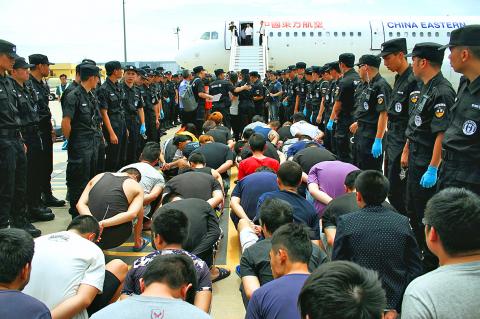Beijing yesterday rejected Taiwan’s protest over Cambodia handing over Taiwanese fraud suspects to Chinese authorities, saying for the first time that the cross-strait communications mechanism “has been suspended” since the new government took office in Taipei last month.
China’s Taiwan Affairs Office spokesperson An Fengshan (安峰山) made the remark while answering reporters’ questions about Taipei’s protest over Cambodia’s decision to accept Beijing’s demand and send Taiwanese telecommunications fraud suspects to China for prosecution.
The mechanism for contact and communication between China and Taiwan “has been suspended” since May 20, as Taipei has not recognized the so-called “1992 consensus,” which he said is the foundation for cross-strait relations that embodies the “one China” principle.

Photo: AFP/STR
Beijing has repeatedly said that the new government of President Tsai Ing-wen (蔡英文) must accept the “1992 consensus” for what it called the warm bilateral ties over the past eight years to continue.
The “1992 consensus” refers to a tacit understanding reached during cross-strait talks in 1992 that both Taiwan and China acknowledge that there is “one China,” with each side having its own interpretation of what that means. In 2006, former Mainland Affairs Council chairman Su Chi (蘇起) admitted he made up the term in 2000, before the Chinese Nationalist Party (KMT) handed power to the Democratic Progressive Party.
Efforts to fight telecom fraud and to protect the rights of victims have won the support of people in both China and Taiwan, An said.
He said that there were 25 Taiwanese in the group of 39 suspects sent to China on Friday, although earlier reports indicated that the group sent to Wenzhou in Zhejiang Province included 18 Taiwanese.
An’s comments came after the Mainland Affairs Council issued a statement on Friday voicing regret and protesting China’s failure to respect the appeal by Taiwan that no more Taiwanese suspects should be sent to China until the two sides can work out a set of principles on how to handle such issues.
Taipei has come under domestic pressure and has tried to prevent Taiwanese arrested overseas from being deported to China, although that pressure has eased after revelations that tens of thousands of Taiwanese, many of whom operate abroad to avoid detection, might be engaging in fraud targeting not only Chinese, but Taiwanese as well.
Dozens of Taiwanese fraud suspects were extradited from Kenya to China through Malaysia earlier this year, triggering an angry response.
As of press time last night, no response was available from the Mainland Affairs Council on An’s remarks.

SECURITY: As China is ‘reshaping’ Hong Kong’s population, Taiwan must raise the eligibility threshold for applications from Hong Kongers, Chiu Chui-cheng said When Hong Kong and Macau citizens apply for residency in Taiwan, it would be under a new category that includes a “national security observation period,” Mainland Affairs Council (MAC) Minister Chiu Chui-cheng (邱垂正) said yesterday. President William Lai (賴清德) on March 13 announced 17 strategies to counter China’s aggression toward Taiwan, including incorporating national security considerations into the review process for residency applications from Hong Kong and Macau citizens. The situation in Hong Kong is constantly changing, Chiu said to media yesterday on the sidelines of the Taipei Technology Run hosted by the Taipei Neihu Technology Park Development Association. With

A US Marine Corps regiment equipped with Naval Strike Missiles (NSM) is set to participate in the upcoming Balikatan 25 exercise in the Luzon Strait, marking the system’s first-ever deployment in the Philippines. US and Philippine officials have separately confirmed that the Navy Marine Expeditionary Ship Interdiction System (NMESIS) — the mobile launch platform for the Naval Strike Missile — would take part in the joint exercise. The missiles are being deployed to “a strategic first island chain chokepoint” in the waters between Taiwan proper and the Philippines, US-based Naval News reported. “The Luzon Strait and Bashi Channel represent a critical access

‘FORM OF PROTEST’: The German Institute Taipei said it was ‘shocked’ to see Nazi symbolism used in connection with political aims as it condemned the incident Sung Chien-liang (宋建樑), who led efforts to recall Democratic Progressive Party (DPP) Legislator Lee Kun-cheng (李坤城), was released on bail of NT$80,000 yesterday amid an outcry over a Nazi armband he wore to questioning the night before. Sung arrived at the New Taipei City District Prosecutors’ Office for questioning in a recall petition forgery case on Tuesday night wearing a red armband bearing a swastika, carrying a copy of Adolf Hitler’s Mein Kampf and giving a Nazi salute. Sung left the building at 1:15am without the armband and apparently covering the book with a coat. This is a serious international scandal and Chinese

COUNTERINTELLIGENCE TRAINING: The ministry said 87.5 percent of the apprehended Chinese agents were reported by service members they tried to lure into becoming spies Taiwanese organized crime, illegal money lenders, temples and civic groups are complicit in Beijing’s infiltration of the armed forces, the Ministry of National Defense (MND) said in a report yesterday. Retired service members who had been turned to Beijing’s cause mainly relied on those channels to infiltrate the Taiwanese military, according to the report to be submitted to lawmakers ahead of tomorrow’s hearing on Chinese espionage in the military. Chinese intelligence typically used blackmail, Internet-based communications, bribery or debts to loan sharks to leverage active service personnel to do its bidding, it said. China’s main goals are to collect intelligence, and develop a